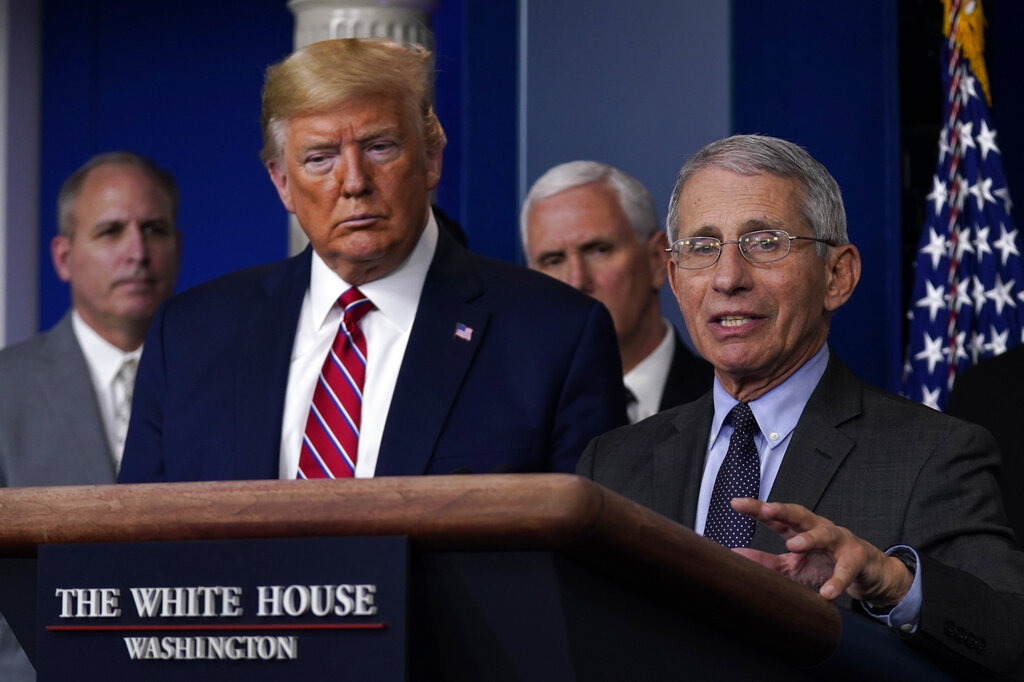In an extraordinary exchange, President Donald Trump and the government's top infectious disease expert, Dr Anthony Fauci, publicly sparred Friday on whether a malaria drug would work to treat people with coronavirus disease.
The scene played out on national television during the daily White House briefing on the outbreak. Anxious for answers, Americans heard conflicting ones from a just-the-facts scientist and a president who operates on gut instinct.
Reporters asked both men — first Fauci then Trump — if a malaria drug called hydroxychloroquine could be used to prevent COVID-19, the disease caused by the virus. A day earlier, when Fauci wasn't with him at that briefing, Trump had called attention to the drug.
On Friday, Fauci took the reporter's question and got right to the point. “No,” he said. “The answer ... is no.
“The information that you're referring to specifically is anecdotal,” Fauci added firmly. “It was not done in a controlled clinical trial, so you really can't make any definitive statement about it.”
He went on to explain that the Food and Drug Administration is looking for a way to make the drug available for emergency use, but in a manner that gives the government data about whether it's safe and effective.
Fauci is director of the National Institute of Allergy and Infectious Diseases at NIH and in more than 30 years has handled HIV, SARS, MERS, Ebola and now the new coronavirus. Currently, there is no medicine specifically approved for treating COVID-19. But Trump stuck to what his gut was telling him. As the two men took turns at the podium, Trump said he disagreed with the notion that there is no magic drug for the coronavirus disease. “Maybe and maybe not, ” he said.
“Maybe there is, maybe there isn't. We have to see.” He struck an upbeat note, while trying not to directly challenge Fauci. “I think without seeing too much, I'm probably more of a fan of that,” he said, referring to the malaria drug. “And we all understand what the doctor said is 100 per cent correct.” Then the president added, “It's a strong drug. So, we'll see.”
Hydroxychloroquine and a similar drug — chloroquine — are sold around the world under a variety of brand and generic names. They can be prescribed off-label by doctors in the United States. They may interfere with the coronavirus being able to enter cells, and some scientists have reported possible encouraging signs in test-tube and other small studies.
Other scientists are skeptical that those promising test-tube results will translate to benefits for patients.
Fauci has a track record of being the fact-based counterpoint to the Trump administration's upbeat assessments of the coronavirus outbreak. For much longer than that, he's specialized in the same calm and persistent repetition of the information he thinks his audience — whether the public or physicians — needs to know.
Weeks ago, after Fauci said that even with all deliberate speed a vaccine could take a year to 18 months, Trump told a political rally one could be ready “relatively soon.”
As administration officials repeatedly assured the public that coronavirus tests were rapidly becoming available, Fauci at a congressional hearing said the lack of widespread testing was “a failing” of the system.
Although Fauci has publicly supported Trump's travel restrictions to try to keep the virus out, he warned the worst was coming even as Trump suggested the crisis was under good control.
Rather than fighting with Trump, he stepped up to the podium Friday to say he's not ruling the drug out, but that it must be studied before making any promises.
Trump wasn't dialing back his enthusiasm. “Look, it may work and it may not work and I agree with the doctor,” Trump said. “I feel good about it. That's all it is. Just a feeling. You know, I'm a smart guy. I feel good about it ... You're going to see soon enough.”
The two even debated the safety of the malaria drug, with Trump saying it has a proven record and Fauci cautioning that must be validated again for coronavirus disease.
In the end, the scientist seemed to be trying to find a way to avoid a direct confrontation with the president. “You know, I'm not dismissing it at all, and I hope that that interpretation wasn't widespread,” Fauci said later on Fox News.
“What I said is that we don't have definitive proof that it works.” It wasn't just Trump with whom Fauci took issue.










